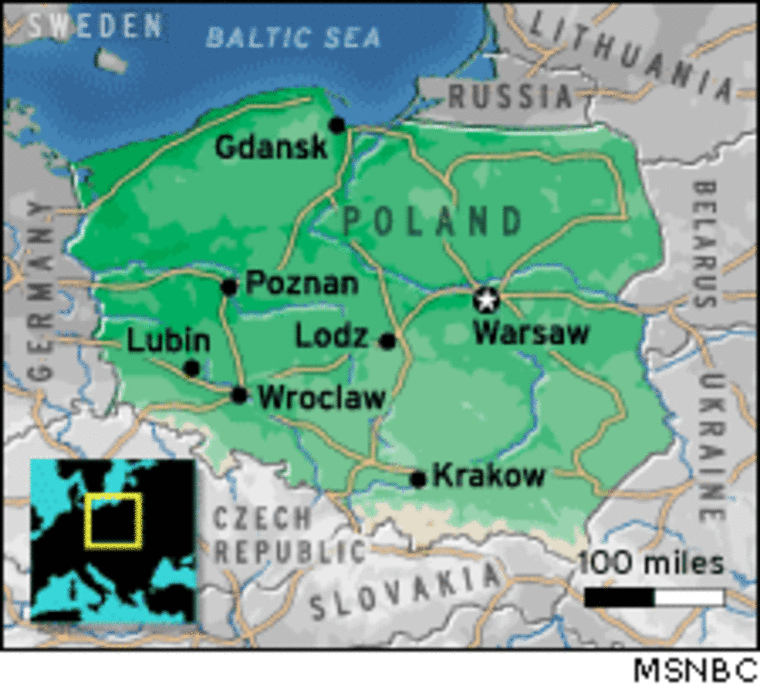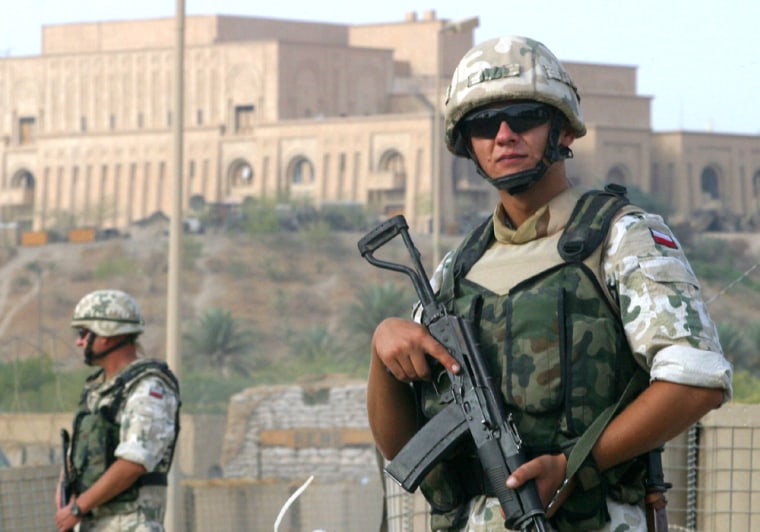At the height of the bitter wrangling over Iraq between the United States, Germany and France, Poland raised the ire of its European Union neighbors by deciding to buy 48 U.S.-built F-16 fighter aircraft to modernize its Soviet-built museum of an air force.
The choice of Lockheed’s F-16 over two European rivals -- the Anglo-Swedish manufacturer Saab, which produces the Viggen, and France's latest Mirage 2000 warplane -- was more than a financial and military victory for an American defense contractor. To many in the EU, poised to admit Poland and 10 other nations into the European fold in May, the decision verged on betrayal. Even as the EU battled for the right to differ with America on major foreign policy issues, the largest of the "new democracies" of the former communist bloc choose to enter what amounts to a multi-decade relationship with the Pentagon.
"The Polish political class sees the country's future as resting on two pillars: on a close relationship with the U.S. and the [EU's] Nice treaty, which guarantees Poland almost the same voice in European affairs as France or Germany," says Kai Olaf Lang, a specialist on Central and Eastern Europe at the German Institute for International and Security Affairs. "Poles view the U.S. as the only realistic guarantee against something going wrong in Russia. The Nice treaty, on the other hand, is their way of preventing Germany and France from controlling Europe."
A foreshadowing
If there is any one country U.S. Defense Secretary Donald Rumsfeld had in mind when he uttered the phrase “new Europe” last January, it is Poland.
In retrospect, Poland's decision to fly F-16s rather than European alternatives was only the first indication of Warsaw's determination to maintain a certain distance from the Franco-German line. In February of last year, as the Iraq debate raged on, Poland topped the list of 13 European countries which signed a letter backing Washington's Iraq policy. An infuriated French President Jacques Chirac chided the Poles and other nations still lined up for EU club privileges to “keep quiet.”
Not to be stifled, by late March Poland's military could boast that its special forces had seized an Iraqi offshore drilling platform in Iraq on behalf of the U.S.-led coalition fighting there, and before long the United States had rewarded Warsaw with command of an entire region of the country.

While the fallout from last year’s acrimonious debate over the Iraq war often is viewed as strictly an issue of transatlantic friction, with Washington and London on one side and Berlin and Paris on the other, Bush administration officials insist the landscape is more complex.
In fact, the Iraq debate opened divisions, too, right in the heart of the European Union. Suddenly, the German-French political relationship that often seems to be the driving force behind EU integration -- the so-called “engine of Europe” -- was showing itself equally adept at dividing it.
An ‘issue of trust’
For Poles, whatever they may have thought about the wisdom of joining the Iraq coalition, the Iraq debate awakened an old fear about their European neighbors.
“The debate over the war made us wonder whether anyone had our interests in mind,” says Janusz Reiter, a former Polish ambassador to Germany. “We were expected to take our directions from the Germans and the French, to ‘be quiet.’ But the French and Germans are surrounded by democracies. On our borders are Ukraine, Belarus and Russia. It’s a very different neighborhood. The way we were treated really raised the issue of trust.”
Poland is neither a small country -- its 38 million people would rank it sixth in the expanded EU of 25 nations, just behind Spain -- nor can it be ignored politically.
It is the largest state in the former Soviet bloc, the birthplace of Solidarity and the current Roman Catholic Pope, a nation whose immigrants sunk roots deep into American soil and the site of unprecedented European betrayals and atrocities during the wars of the 20th century.
‘Because of history’
“If you make people in Poland choose between the U.S. and Europe in the security field, they will choose the U.S.,” says Reiter, who now heads Warsaw’s Center for International Relations. “Why? Because of history, but also the feeling that in security policy, Europe still is a promise. The U.S. is reality.”
If there is anything Polish history teaches, it is not to rely on European promises. France and Britain guaranteed Poland’s security in the 1930s, then watched powerless as Germany and the Soviet Union brutally carved it up.
“For western European intellectuals, anti-Americanism is like rebelling against one’s parents – a desire for emancipation,” he says. “In Poland, anti-Americanism was a tool of communist rule and it leaves a very bad taste. People forget how differently these issues look from eastern Europe.”
Even as Chirac and his German counterpart, Chancellor Gerhard Schroeder, leveled Security Council veto threats and railed against American recklessness, mid-sized and smaller states in Europe began to worry about another unattractive possibility: a world where the U.S. disengages from Europe and France and Germany, by virtue of the large populations and political cooperation, dictate the terms of European Unity to the rest of the continent.
“I understand this concern, why the little countries of Europe would support the U.S.,” says Gunnar Ulbrich, a Berlin-based media consultant whose firm works all over Europe. “These countries don’t want to get completely under the control of Germany and France. They want to keep a certain connection to the United States to help them make their way in the EU. Otherwise, they have no recourse, and the rules and regulations adopted by the big countries, whether it’s media or medicine or a European army, are imposed 100 percent on the rest.”
A challenge to the big boys
The latest and more serious manifestation of this fissure appeared in December at the European Union’s semi-annual summit in Brussels. Poland and another mid-sized Euro-power, Spain, refused to buckle under German and French pressure to cede some voting rights back to the larger states before the EU adopts a new EU constitution. The constitution is the lynchpin of efforts by European federalists to turn the loosely constructed trade and political union into a true super-state, complete with its own military and foreign policy arms.
But the summit in Brussels, heralded beforehand as the European equivalent of the constitutional convention in Philadelphia in 1787, collapsed in a dispute over how to apportion votes out to member states. The draft constitution would give each country a certain number of votes according to population. But Spain and Poland, which had been promised near equality with Germany and France in the Treaty of Nice in 2001, refused to go along. They saw no reason to water down the Nice system, under which Germany and France, along with Italy and the UK, would get 29 votes in EU issues, with Spain and Poland receive 27 -- this despite the fact that they have barely half the population of Germany.
"Poland is especially afraid of the EU being a kind of antagonistic superpower as far as the United States is concerned," says Andrzej Bryk, professor of American Studies at Jagiellonian University in Krakow who has written books on constitutional democracy. "We're trying to tell Germany and France that we are not really interested in that direction. And German efforts to rewrite the Nice Treaty did not go down well."
Washington's influence in all this can easily be overstated.
Says Lang, the German analyst: "What all the players need to understand, and that includes Washington, is that the 'new Europe' won't be a place where a permanent alliance exists on all issues. On security, the British, the Polish and the Spanish may lead, with France and Germany taking part sometimes. On integration, the French and Germans may lead. And Poland, certainly, is trying to become the kind of standard bearer for the new central and eastern European states. It is all very fluid now, so even with Poland's historical worries, they will have to be more flexible in the future to really influence things. And that, and not geography, is what separates 'old' from 'new' Europe."
Coming Thursday: Britain rethinks its role
